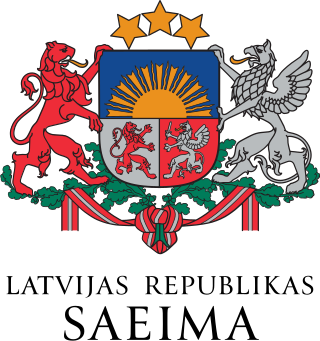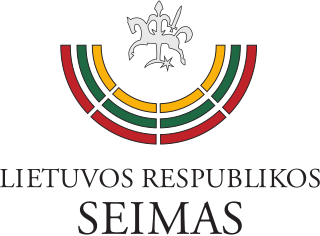Citations
Notes
Related Research Articles

Volhynian Voivodeship was a unit of administrative division and local government in the Grand Duchy of Lithuania from 1566 until 1569 and of the Polish Crown within the Polish–Lithuanian Commonwealth from the 1569 Union of Lublin until the Third Partition of Poland in 1795. It was part of the Ruthenian lands in the Lesser Poland Province.

The Saeima is the parliament of the Republic of Latvia. It is a unicameral parliament consisting of 100 members who are elected by proportional representation, with seats allocated to political parties which gain at least 5% of the popular vote. Elections are scheduled to be held once every four years, normally on the first Saturday of October. The most recent elections were held in October 2022.

The Seimas of the Republic of Lithuania, or simply the Seimas, is the unicameral legislative body of the Republic of Lithuania. The Seimas constitutes the legislative branch of government in Lithuania, enacting laws and amendments to the Constitution, passing the budget, confirming the Prime Minister and the Government and controlling their activities.

The Wilno Voivodeship was one of 16 Voivodeships in the Second Polish Republic, with the capital in Wilno. The jurisdiction was created in 1926 and populated predominantly by Poles, with notable minorities of Belarusians, Jews and Lithuanians. Before 1926, the voivodeship's area was known as the Wilno Land; it had the same boundaries and was also within the contemporary borders of Poland at the time.
This article gives an overview of liberalism in Lithuania. Liberalism was a major force in Lithuania since 1900. Next to the urban citizens, agrarian liberal parties became active. It is limited to liberal parties with substantial support, mainly proved by having had a representation in parliament. The sign ⇒ denotes another party in that scheme. For inclusion in this scheme it isn't necessary so that parties labeled themselves as a liberal party.

A sejmik was one of various local parliaments in the history of Poland and history of Lithuania. The first sejmiks were regional assemblies in the Kingdom of Poland, though they gained significantly more influence in the later era of the Polish–Lithuanian Commonwealth. Sejmiks arose around the late 14th and early 15th centuries and existed until the end of the Commonwealth in 1795, following the partitions of the Commonwealth. In a limited form, some sejmiks existed in partitioned Poland (1795–1918), and later in the Second Polish Republic (1918–1939). In modern Poland, since 1999, the term has revived with the voivodeship sejmiks, referring to the elected councils of each of the 16 voivodeships.
Poland has a multi-party political system. On the national level, Poland elects the head of state – the president – and a legislature. There are also various local elections, referendums and elections to the European Parliament.

The General Sejm was the bicameral legislature of the Polish–Lithuanian Commonwealth. It was established by the Union of Lublin in 1569 following the merger of the legislatures of the two states, the Sejm of the Kingdom of Poland and the Seimas of the Grand Duchy of Lithuania. It was one of the primary elements of the democratic governance in the Commonwealth. The sejm was a powerful political institution. The king could not pass laws without its approval.

The Permanent Council was the highest administrative authority in the Polish–Lithuanian Commonwealth between 1775 and 1789 and the first modern executive government in Europe. As is still typically the case in contemporary parliamentary politics, the members of the Council were selected from the parliament or Sejm of the Commonwealth. Even though it exerted some constructive influence in Polish politics and government, because of its unpopularity during the Partitions period, in some Polish texts it was dubbed as Zdrada Nieustająca - Permanent Betrayal.

The general election in the Republic of Central Lithuania was an election to the Vilnius Sejm (parliament) of the Polish-dominated Republic of Central Lithuania on 8 January 1922. The new parliament was intended to formally legalize incorporation of Central Lithuania into Poland. Such measure was fiercely opposed by Lithuania, which claimed the territory for itself. The election was boycotted by non-Polish population and its results were unrecognized by either the Lithuanian government in Kaunas or the League of Nations. The elected parliament convened in February and, as expected, voted on 20 February 1922 to have the Republic incorporated into Poland. At the end of March 1922, Central Lithuania became Wilno Land of the Second Polish Republic.
The sejm was an early parliament in the Grand Duchy of Lithuania. It was active from 1445 to 1569, when it was officially abolished by the Union of Lublin. The Sejm was an irregular gathering of the Lithuanian nobility, called as needed by the Grand Duke or during an interregnum by the Lithuanian Council of Lords. The meetings would usually last one or two weeks. Sejm gradually evolved from a meeting of the most powerful magnates to a full legislative institution representing all of the nobility. The Sejm was not the main political player as it was overshadowed by the Council of Lords. The Union of Lublin created a new state, the Polish–Lithuanian Commonwealth, and joined the Sejm of Lithuania with Sejm of Poland into one Sejm of the Polish–Lithuanian Commonwealth. However, the Sejm continued to convene under the name of Lithuanian Convocation. In total there were 40 Sejm and 37 Convocations.

Jakub Wygodzki was a Polish–Lithuanian Jewish politician, Zionist activist and a medical doctor. He was one of the most prominent Jewish activists in Vilnius. Educated as a doctor in Russia and Western Europe, he established his gynecology and pediatric practice in 1884. In 1905, he was one of the founding members of the Constitutional Democratic Party (Kadets) in Vilnius Region. In 1918, he was co-opted to the Council of Lithuania and briefly served as the first Lithuanian Minister for Jewish Affairs. After Vilnius was captured by Poland, Wygodzki was elected to the Polish parliament (Sejm) in 1922 and 1928. He died in the Lukiškės Prison during the first months of the German occupation of Lithuania during World War II.
The Legislative Sejm or Constituent Sejm was the first national parliament (Sejm), and simultaneously Constituent Assembly of the newly independent Poland, sitting from 1919 to 1922. It was elected in the 1919 Polish legislative election.
The Association of National Parties and Organizations was a right-wing electoral alliance of the political parties in the Republic of Central Lithuania. Following the 1922 general elections, it held 43 seats in the Sejm of Central Lithuania, the most of all parties. It consisted of the Popular National Union, National People's Union, Christian National Labour Party, and Polish Nonpartisan Organization. It supported the incorporation of the Central Lithuania into Poland, and the transfer of the executive powers to the Legislative Sejm of Poland. Its leader was Witold Bańkowski.
The Popular Councils was a centre-left political party in the Republic of Central Lithuania. Following the 1922 general elections, it held 34 seats in the Sejm of Central Lithuania, being the second most popular party. After the Peasant Group of Popular Councils broke away from the party, its number of seats dropped to 27. Its ideology was moderate radicalism, and it supported the incorporation of Central Lithuania into Poland. Its leader was Józef Małowieski.
The Polish People's Party of Wilno Land was a left-wing political party in the Republic of Central Lithuania. Following the 1922 general elections, it held 13 seats in the Sejm of Central Lithuania. Its ideology consisted of the agrarianism and agrarian socialism, and it supported the authonomy of Central Lithuania from Poland. Its leader was Bronisław Krzyżanowski.
The Popular Association "Odrodzenie-Wyzwolenie" was a centre-left political party in the Republic of Central Lithuania. Following the 1922 general elections, it held 5 seats in the Sejm of Central Lithuania. Its political programme was identical to the one of Polish People's Party "Wyzwolenie" that operated in Poland, and was based on agrarianism and agrarian socialism. It supported the authonomy of Central Lithuania from Poland, however it did not oppose the possible future federation with it, as proposed by Józef Piłsudski. Its leader was Ludwik Chomiński.
The Popular Association "Odrodzenie" was a centre-left political party in the Republic of Central Lithuania. Following the 1922 general elections, it held 3 seats in the Sejm of Central Lithuania. Its political programme was based on agrarianism and agrarian socialism, and was similar to the one of Polish People's Party "Wyzwolenie" that operated in Poland. It supported the federation of Central Lithuania with Lithuania. Its leader was Stefan Mickiewicz.

Sejm of Central Lithuania, also known as the Vilnius Sejm, or Wilno Sejm or the Adjudicating Sejm, was the parliament of the short-lived state of Central Lithuania. Formed after the elections of 8 January 1922, it held its proceedings from 1 February to 1 March of that year. It had 106 deputies. Dominated by Polish representatives, it requested Central Lithuania's annexation by Poland and dissolved shortly afterward.
References
- 1 2 Sejm Wileński 1922 : przebieg posiedzeń według sprawozdań stenograficznych w opracowaniu kancelarji sejmowej , Vilanous, 1922.
- ↑ Adam Uziembło: Niepodległość socjalisty, Warsaw, 2008, p. 246.